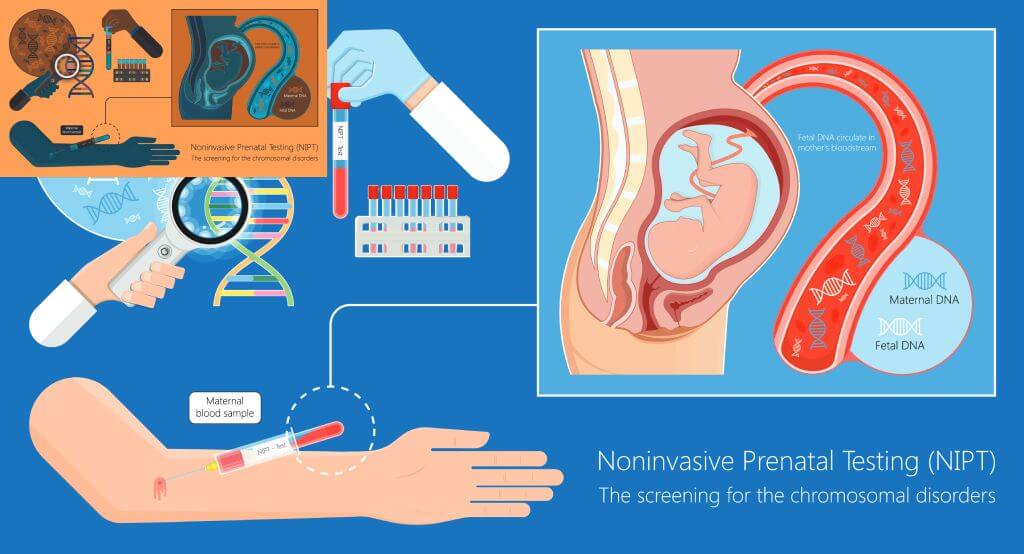Non-Invasive Prenatal Testing (NIPT) is one of the most advanced and reliable prenatal screening tools available today. But is it meant for every pregnancy? Or only for certain women?
In this blog, we explore who should get an NIPT test, what defines a high-risk pregnancy, and why NIPT is increasingly being recommended for all pregnant women — especially at diagnostic centers like NM Medical in Mumbai, Bangalore, Pune, and Nashik.
What is NIPT?
NIPT (Non-Invasive Prenatal Testing) is a simple, safe blood test that screens for common chromosomal abnormalities in a fetus. It analyzes cell-free fetal DNA (cfDNA) circulating in the mother’s blood and can be performed from as early as 10 weeks of pregnancy.
Conditions screened include:
- Down syndrome (Trisomy 21)
- Edwards syndrome (Trisomy 18)
- Patau syndrome (Trisomy 13)
- Sex chromosome abnormalities
- (In extended panels) Microdeletions and rare syndromes
What is a High-Risk Pregnancy?
A pregnancy is considered high-risk when there is a greater chance of complications or birth defects, especially related to genetic or chromosomal conditions. Several factors contribute to this classification, and these are exactly the situations where NIPT is most strongly recommended.
Who Should Definitely Consider an NIPT Test?
1. Maternal Age 35 and Above
Women who are 35 years or older at the time of delivery are at a higher risk of giving birth to babies with chromosomal conditions like Down syndrome.
NIPT is often recommended as a first-line test in these pregnancies.
2. Abnormal Ultrasound or NT Scan
If your NT scan (Nuchal Translucency) or first-trimester ultrasound shows abnormalities, your doctor may suggest an NIPT to assess chromosomal risk before proceeding with invasive procedures.
3. Positive Double Marker or Triple Marker Test
If your Double Marker or Triple Marker test results show high risk, NIPT is a non-invasive follow-up that provides much higher accuracy with fewer false positives.
4. Family History of Genetic Disorders
If there’s a known history of chromosomal disorders (like Trisomy 21 or Turner syndrome) in either parent’s family, NIPT can provide peace of mind or early intervention options.
5. Previous Pregnancy with Genetic Abnormality
If you’ve had a previous baby diagnosed with a chromosomal condition, your doctor may advise NIPT to screen your current pregnancy with greater precision.
6. IVF or Assisted Pregnancy
Pregnancies through IVF or ICSI may involve additional risks. Many couples undergoing fertility treatment choose to screen for chromosomal abnormalities using NIPT.
7. Multiple Pregnancy with Risk Factors
In twin pregnancies, NIPT can still be useful (depending on the lab panel). If any risk factors are present, your doctor may advise testing.
Should Low-Risk Pregnancies Consider NIPT?
Absolutely. While NIPT was initially recommended for high-risk pregnancies, many experts today advocate universal NIPT screening due to:
- >99% accuracy for detecting Down syndrome
- Low false positive rate
- No physical risk to mother or baby
- Fewer unnecessary invasive procedures (like amniocentesis)
At NM Medical, we see a growing number of expectant mothers choosing NIPT proactively, even in low-risk scenarios, for peace of mind.
Why Choose NIPT Over Other Screening Tests?
| Test Type | Accuracy for Trisomy 21 | Invasive? | Timing |
|---|---|---|---|
| Double Marker | ~85% | No | 11–14 weeks |
| NIPT | >99% | No | From 10 weeks |
| Amniocentesis | 100% (diagnostic) | Yes | 15–20 weeks |
NIPT offers a middle ground between basic blood tests and invasive procedures — combining accuracy with safety.
Why Choose NM Medical for NIPT Testing?
NM Medical offers:
- NABL-accredited labs and certified phlebotomists
- Genetic counseling included with every NIPT test
- Quick turnaround (7–10 days)
- Home sample collection in select locations
- Trusted by OB-GYNs across Mumbai, Bangalore, Pune, and Nashik
Whether you are high-risk or simply want clarity, NM Medical provides reliable, safe, and convenient NIPT services tailored to your needs.
Ready to Get Tested?
If you’re wondering whether NIPT is right for your pregnancy, talk to our genetic counselor or OB-GYN team.
We’re here to guide you every step of the way.


